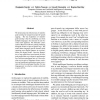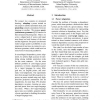10 search results - page 2 / 2 » Unsupervised Word Alignment with Arbitrary Features |
EMNLP
2008
13 years 6 months ago
2008
We demonstrate the effectiveness of multilingual learning for unsupervised part-of-speech tagging. The key hypothesis of multilingual learning is that by combining cues from multi...
EMNLP
2009
13 years 3 months ago
2009
We connect two scenarios in structured learning: adapting a parser trained on one corpus to another annotation style, and projecting syntactic annotations from one language to ano...
ACL
2007
13 years 6 months ago
2007
Recently, confusion network decoding has been applied in machine translation system combination. Due to errors in the hypothesis alignment, decoding may result in ungrammatical co...
ICCBR
2007
Springer
13 years 11 months ago
2007
Springer
Abstract. Creating case representations in unsupervised textual case-based reasoning applications is a challenging task because class knowledge is not available to aid selection of...
JCB
2007
13 years 5 months ago
2007
Locality is an important and well-studied notion in comparative analysis of biological sequences. Similarly, taking into account affine gap penalties when calculating biological ...


